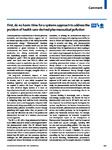First, do no harm: time for a systems approach to address the problem of health-care-derived pharmaceutical pollution
| dc.contributor.author | Thornber, K | |
| dc.contributor.author | Adshead, F | |
| dc.contributor.author | Balayannis, A | |
| dc.contributor.author | Brazier, R | |
| dc.contributor.author | Brown, R | |
| dc.contributor.author | Comber, S | |
| dc.contributor.author | Court, C | |
| dc.contributor.author | Davidson, I | |
| dc.contributor.author | Depledge, M | |
| dc.contributor.author | Farmer, C | |
| dc.contributor.author | Gibb, S | |
| dc.contributor.author | Hixson, R | |
| dc.contributor.author | Kirchhelle, C | |
| dc.contributor.author | Moore, K | |
| dc.contributor.author | Motta, M | |
| dc.contributor.author | Niemi, L | |
| dc.contributor.author | Owen, S | |
| dc.contributor.author | Pencheon, D | |
| dc.contributor.author | Pfleger, S | |
| dc.contributor.author | Pitchforth, E | |
| dc.contributor.author | Powell, N | |
| dc.contributor.author | Schmidt, W | |
| dc.contributor.author | Smith, R | |
| dc.contributor.author | Sowman, G | |
| dc.contributor.author | Tyler-Batt, W | |
| dc.contributor.author | Wilkinson, H | |
| dc.contributor.author | Wilson, ECF | |
| dc.contributor.author | Fleming, L | |
| dc.contributor.author | Gaze, W | |
| dc.contributor.author | Tyler, C | |
| dc.date.accessioned | 2023-02-14T11:57:37Z | |
| dc.date.issued | 2022-12 | |
| dc.identifier.issn | 2542-5196 | |
| dc.identifier.issn | 2542-5196 | |
| dc.identifier.uri | http://hdl.handle.net/10026.1/20346 | |
| dc.description.abstract |
Chemical pollution is considered one of the nine planetary boundaries, and increasing evidence suggests that we are already operating outside of this, risking irreversible environmental change. Pharmaceutical chemicals are vital components of modern health care, but their contamination of global waterways is threatening environmental and human health, contributing to biodiversity loss, driving antimicrobial resistance, and jeopardising progress towards the sustainable development goals. With the global pharmaceutical market now worth more than US$1·25 trillion and continuing to grow as populations age and suffer from more chronic, non-communicable diseases, there is an urgent need to integrate pharmaceutical pollution into sustainable health-care strategies, alongside efforts to reduce carbon and plastic waste. The long-term detrimental impacts of some pharmaceuticals in the environment have been known for decades, and it is now widely recognised that ambitious legislative and non-legislative measures are required to address this issue. Progress to date has been restricted largely because of a focus on improving human health and financial outcomes, and the complexity of global pharmaceutical value chains. High-income countries (HICs) are the major consumers of pharmaceuticals, and face a substantial challenge in mitigating rising local pollution levels emanating from patient excreta and inappropriate disposal, while simultaneously taking responsibility for the considerable manufacturing pollution externalities created through globalising their supply chains. Here, we present a UK case study that illustrates the scale of the problem and demonstrates the need for a cohesive, cross-sectoral systems approach. | |
| dc.format.extent | e935-e937 | |
| dc.format.medium | ||
| dc.language | en | |
| dc.language.iso | eng | |
| dc.publisher | Elsevier BV | |
| dc.subject | Environmental Pollution | |
| dc.subject | Health Facilities | |
| dc.subject | Systems Analysis | |
| dc.subject | Pharmaceutical Preparations | |
| dc.title | First, do no harm: time for a systems approach to address the problem of health-care-derived pharmaceutical pollution | |
| dc.type | journal-article | |
| dc.type | Editorial Material | |
| plymouth.author-url | https://www.ncbi.nlm.nih.gov/pubmed/36495886 | |
| plymouth.issue | 12 | |
| plymouth.volume | 6 | |
| plymouth.publication-status | Published | |
| plymouth.journal | The Lancet Planetary Health | |
| dc.identifier.doi | 10.1016/s2542-5196(22)00309-6 | |
| plymouth.organisational-group | /Plymouth | |
| plymouth.organisational-group | /Plymouth/Faculty of Science and Engineering | |
| plymouth.organisational-group | /Plymouth/Faculty of Science and Engineering/School of Geography, Earth and Environmental Sciences | |
| plymouth.organisational-group | /Plymouth/REF 2021 Researchers by UoA | |
| plymouth.organisational-group | /Plymouth/REF 2021 Researchers by UoA/UoA06 Agriculture, Veterinary and Food Science | |
| plymouth.organisational-group | /Plymouth/Research Groups | |
| plymouth.organisational-group | /Plymouth/Research Groups/BEACh | |
| plymouth.organisational-group | /Plymouth/Research Groups/Marine Institute | |
| plymouth.organisational-group | /Plymouth/Users by role | |
| plymouth.organisational-group | /Plymouth/Users by role/Academics | |
| dc.publisher.place | Netherlands | |
| dcterms.dateAccepted | 2022-01-01 | |
| dc.rights.embargodate | 2023-2-23 | |
| dc.identifier.eissn | 2542-5196 | |
| dc.rights.embargoperiod | Not known | |
| rioxxterms.versionofrecord | 10.1016/s2542-5196(22)00309-6 | |
| rioxxterms.licenseref.uri | http://www.rioxx.net/licenses/all-rights-reserved | |
| rioxxterms.licenseref.startdate | 2022-12 | |
| rioxxterms.type | Journal Article/Review |


